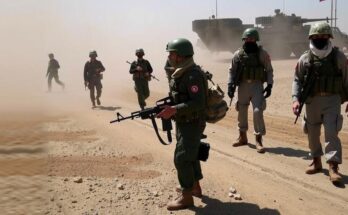On Monday, Hamas confirmed the death of its leader in Lebanon due to an Israeli airstrike, as the Popular Front for the Liberation of Palestine reported the fatalities of three leaders in a separate airstrike in central Beirut. This marks a notable escalation of military actions by Israel, which has not targeted central Beirut since 2006, amid rising tensions in the region and broader implications for soldiers and civilians alike.
In a significant escalation of conflict in the Middle East, the Palestinian militant group Hamas announced the killing of its leader in Lebanon, Fateh Sherif Abu el-Amin, due to an Israeli airstrike in the southern region of the country. Concurrently, the Popular Front for the Liberation of Palestine (PFLP) reported the deaths of three of its leaders in an Israeli drone strike on central Beirut, marking a rare occurrence of Israeli military action within Lebanon’s capital since 2006. Initial reports indicated extensive destruction in the Kola district, where an explosion severely damaged an apartment building and caused multiple casualties. The violence escalated across Lebanon, with over 100 fatalities reported in a single day and significant displacement of civilians as the ongoing conflict continues to affect the region. Israel remains resolute in its military strategy, targeting key figures within militant groups while also conducting operations in Yemen against Houthi targets, reflecting a broader regional conflict. Striking further at the leadership of Hezbollah, Israel’s recent operations also resulted in the death of senior commanders, solidifying its stance that it will persist with airstrikes targeting militants. Amid these developments, U.S. officials stressed the importance of Israel’s efforts but underscored the need to avoid a broader war. Diplomatically, various nations, including Saudi Arabia and Iran, have voiced their concerns and criticisms regarding the Israeli actions, highlighting a deepening international interest in the stability of Lebanon and its connections to the larger regional dynamics.
The Middle East has experienced significant unrest due to ongoing conflicts involving Israel and various Palestinian factions, including Hamas and the Popular Front for the Liberation of Palestine (PFLP). The region has been marked by military actions that reflect longstanding tensions. Israel’s recent strikes in Lebanon are of particular concern, as this indicates a potential widening of hostilities that had not seen significant escalation in Beirut since 2006. The political landscape is further complicated by the involvement of other regional powers, such as Iran and its support for militant groups, as well as the responses from the United States and other nations regarding the conflict and its implications for regional stability.
The recent Israeli airstrikes in Lebanon represent a critical juncture in the ongoing conflict, leading to considerable casualties, specifically among key militant leaders. The heightened military actions within Beirut signify a shift in operational strategies, while widespread devastation underscores the impact on civilian lives. International responses vary, with assertions from regional powers expressing opposition to Israel’s military efforts. Moving forward, the nexus of internal and external pressures will undoubtedly play a vital role in shaping the future dynamics of the Middle East conflict.
Original Source: www.theguardian.com




